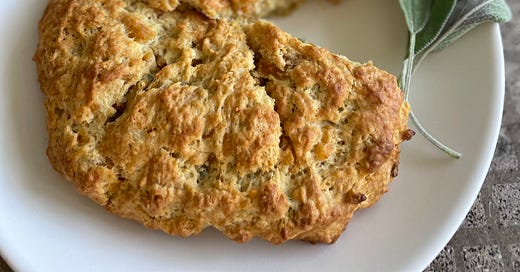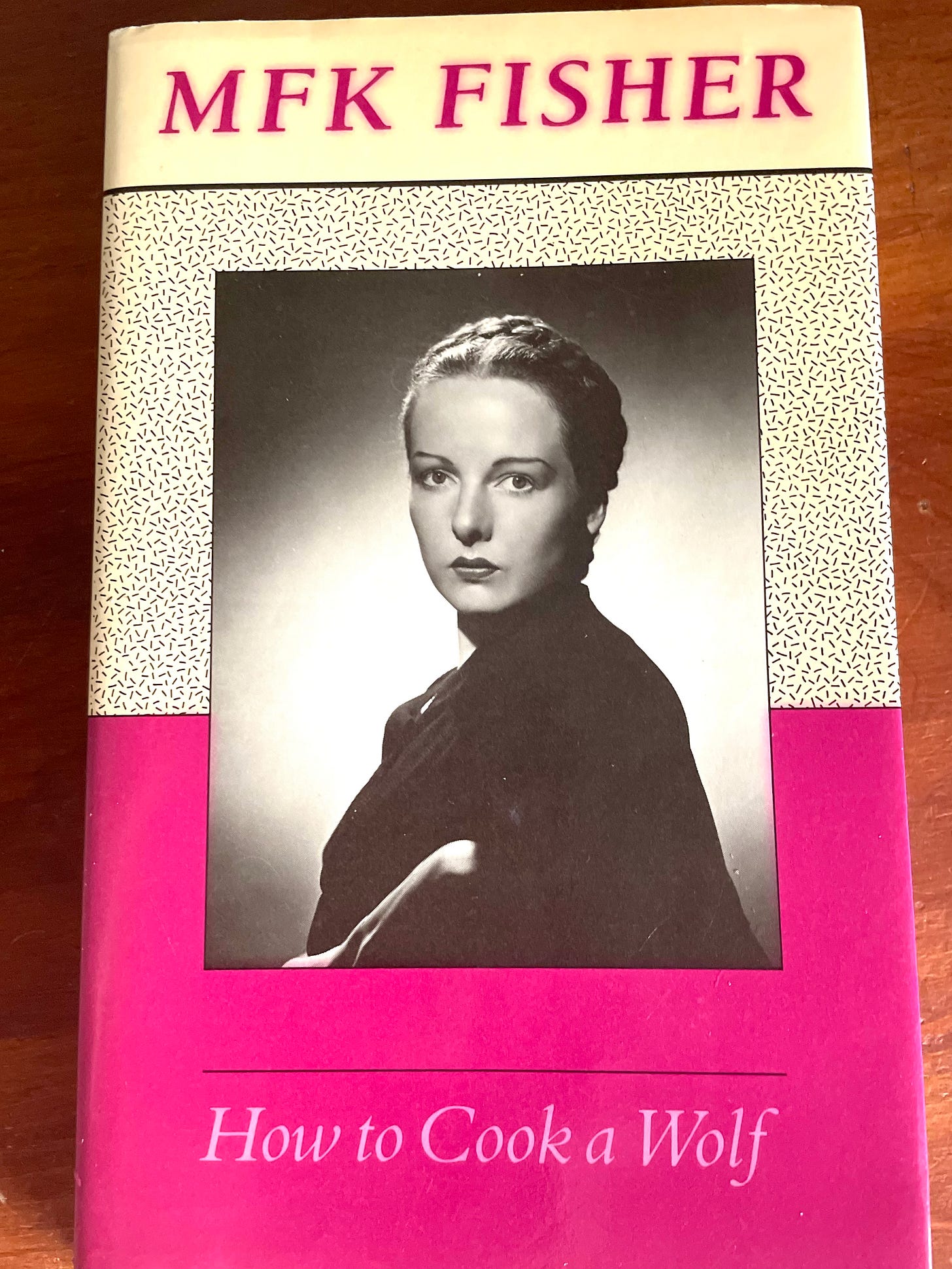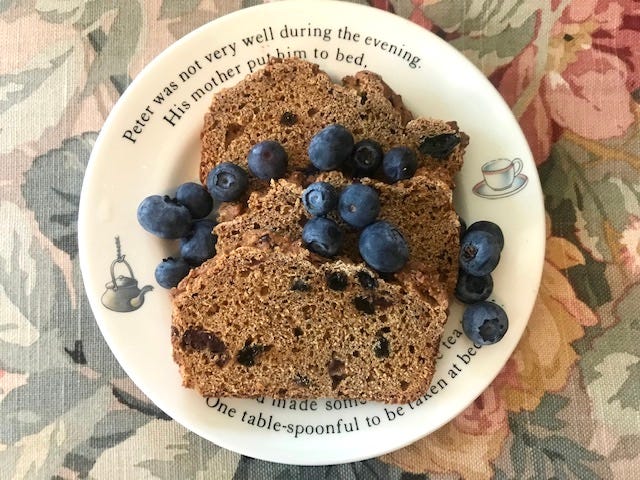Broccoli Rising, and No Wolves Were Harmed in Writing This Memorial Day Newsletter
“War is a beastly business,” wrote M.F.K. Fisher in her 1942 work, How to Cook a Wolf, “but one proof that we are human is our ability to learn, even from it, how better to exist.” I keep hoping this is true. There’ve been so many wars since World War II (that’s the war Fisher was referring to and living through, young ‘uns), and the rage, violence, grief, and loss keep mounting. And here we are on Memorial Day.
Sure it’s a welcome three-day weekend and the unofficial start of summer, but Memorial Day was created to honor our servicemen and women, those who gave their lives to defending America. Existing better is a good way to honor them. So what does that mean and how do we do it? And how do wolves enter into it?
For the love of God, Fisher didn’t mean cooking an actual wolf. That’d be 1) illegal and 2) way, way, far from vegan. Fisher’s wolf is metaphorical. Do you remember the story of the Three Little Pigs? The wolf at the door means trouble, hardship. War brings that and more. It brings destruction. Existing better calls on us to create. Even in desperate times when there’s little to create with.
It takes some ingenuity and spirit to send that wolf running. Fisher, who pioneered food writing as a way to view and experience the world, had that kind of spark and style in spades. How to Cook a Wolf combined a roll-up-your-sleeves kind of good cheer with recipes that did more with less. Because — hard to wrap your head around it — less was all there was. World War I and II on the home front meant ration books. What you could eat was determined by what you could get. Think of the pandemic’s supply chain disruptions— no toilet paper, no yeast, no flour. Now imagine them lasting. For years.
Even in dire times and wartime, we have to live and eat. How to Cook A Wolf was about learning to do it stylishly. Even when there’s little to work with. Look, I’m sure there was wartime hoarding and black market dealings. But our government called on everyone to do their bit for the war effort. Folks were asked to be part of the process, encouraged to be creative, frugal.
Eighty years on, we’re encouraged to do just the opposite, with food companies waging marketing campaigns urging us to buy, eat, consume. And we do. We blithely waste food — almost half of it — confident there’ll always be more. What kind of war effort or any kind of effort is that?
It’s time to step up. Here’s a dozen ways to reduce food waste.
Oh, and here’s a 13th. Cook. Don’t cook a wolf, but get back in the kitchen. More kitchen literacy means less food waste. Then, you can reward yourself with a treat. Like scones.
Scones, baked goods balancing between biscuit and muffin, are believed to date back to 16th century Scotland. There, scones can be mildly savory or mildly sweet, golden outside, yielding easily to a soft, tender inside. They’re a pleasing breakfast or teatime treat, especially when the weather is dreich (Scottish term, Google it, or better yet, listen as Scottish novelist Margot Livesey explains) In more-is-more America, scones are buttery, often big as your head, and they are cake.
Something got lost in translation. Not just the item but the word itself. When Margot says scone, it rhymes with fawn, dawn, and lawn — gentle things. When I say scone, it rhymes with moan, thrown, and stone. And truth be told, some scones can dry and stonelike. Not mine.
My vegan cheese scones are delicate and cheesy-tasting, yet made without cheese, butter, milk, or sugar, rationed or otherwise. That said, they are far from austere war grub. They’re an easier and more luxe version of war effort cheese muffins, but they are not meant to be as big as your head, they are not meant to be cake. They’re scones.
Vegan Cheese Scones
A tip for scone success — remember cold and hot. Freeze the vegan butter, then grate it into the dough. Keep the mixing light and quick so the dough stays cold. Then shape and place in a hot oven.
I prefer to shape the dough into a round and score it into wedges. You can also make drop scones, dropping the dough from a large mixing spoon onto the baking sheet, keeping the scones about 2 inches apart.
Broccoli Confidential subscribers can find the recipe for vegan cheese scones at the end of the newsletter. If you haven’t upgraded your subscription yet you can do it now!
If it’s cake you’re looking for cake, granny cake, a recipe from British war-era mums, is another example of frugal cookery. Made without fat and eggs and only a little sugar. It’s an earnest and clever quick bread, and I’ve always had a soft spot for them. Granny cake, aka granny loaf, gets its lift from baking powder, not yeast. Its sweetness comes from dried fruit, pantry-friendly and nutrient dense.
It’s kin to oaty, grainy, earthy Irish soda bread, which I love, forever tinkering with my vegan recipe. Here’s this year’s model. Intrigued by these do more with less recipes? Here’s 200 more.
The warring impulse seems hardwired in us, alas. But let us use Memorial Day as a chance to be more than just passive consumers. As Fisher wrote, “When we exist without thought or thanksgiving we are not men but beasts.” We have the power to produce, participate, act. We have the power to exist better. Happy Memorial Day.
You can get access to full recipes on a regular basis with a paid subscription. Not a paid subscriber yet? No problem! Join now to enjoy exclusive content like the recipe below and much more.
Not quite ready to upgrade to be a paid subscriber but want to support Broccoli Rising? Adding to my tip jar helps keep me in broccoli and beans. I’m madly grateful. Thanks.
Thanks to you all for reading and subscribing. This issue of Broccoli Rising is free. Please spread the broccoli love and share.
You can also visit SoulfulVegan.com to find more recipes and connect with me online at YouTube, Instagram, Twitter and Substack Notes.












